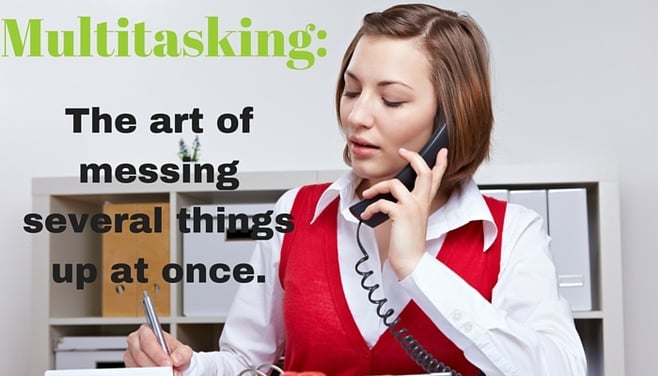
I used to think that no one was better at multitasking than I was. At one point in my life, I was a single mom, full time student, landlord, and worked full time on the ground floor of a really cool tech start up. Multitasking was my life. My mom used to ask me when I was going to stop burning the candle at both ends. To which I replied, "I'm not just burning it at both ends, I'm breaking it in half and burning both of those ends at the same time."
I was proud of my ability to juggle. What I didn't know was how bad I was actually performing. Multitasking was making me stupid and stressed. Assignments took longer, mistakes were made, I was always late, and because I was stressed out and miserable, so was everyone around me.
Later, when I started my own business and then my own journey to the 'dark side' of sales- I was still holding on to my multitasking ways. I took pages of notes on calls because I didn't want to forget anything.
Recently the question was posed in a group on LinkedIn, "How do you take notes during a sales call?" With nearly 30 people commenting on their how, everyone seemed to be making the same mistakes I did.
Why is note taking during a sales call a bad idea?
Isn't it hard to be actively present and listening to people if you are busy taking notes, no matter how you are doing it? Studies show that multitasking actually reduces your IQ and ability to focus on what the other person is saying, never mind being able to pick up on nuisances like body language and their tone of voice. It's not just what is being said that's important, but how it is being said. If you are actively listening, you aren't doing anything else and you are more likely to remember what is important.
Many will argue, like I used to believe, that taking notes reminds you of what is important and that your client will see that you are taking what they say seriously. Hmm, yeah- except for the fact that what you are writing may be important to you, but who cares what you think? Isn't it what is important to your buyer that really matters?
So how should you have productive calls? Here's what we coach to our clients:
- Be prepared.
Before any call or meeting happens, the job of the sales person is to make sure that everyone questions and expectations are known and met. That means setting up agendas before hand and getting everyone's input. What do they want to get done on this call or meeting? What do they expect to happen after? When does that need to happen by? - Be present.
I can't stress this enough. To be fully present and actively listening, your job as the salesperson is as the master of ceremonies. You can't pick up on body language, or tone during the communications to know what next question to ask, or what assumptions to push back on if you are diligently typing or writing away what was said. - Be thorough.
Once a call or meeting is over, send everyone a summary of what was discussed and what was promised. Ask if there was anything you missed, or anything that others may have thought of later to ask. Confirm what was agreed on that needs to happen next. This gives everyone the chance to add or change things after some reflection and continue the conversation. You may even find some pieces of information that you forgot to ask at the time and you can address in your summary.







